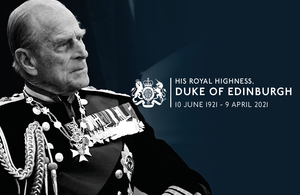Mr Speaker, I beg to move:
That an Humble Address be presented to Her Majesty expressing the deepest sympathies of this House on the death of His Royal Highness The Prince Philip, Duke of Edinburgh, and the heartfelt thanks of this House and this nation for his unfailing dedication to this Country and the Commonwealth, exemplified in his distinguished service in the Royal Navy in the Second World War; his commitment to young people in setting up The Duke of Edinburgh’s Award, a scheme which has touched the lives of millions across the globe; his early, passionate commitment to the environment; and his unstinting support to Your Majesty throughout his life.
Mr Speaker, it is fitting that on Saturday His Royal Highness the Duke of Edinburgh will be conveyed to his final resting place in a Land Rover, which Prince Philip had designed himself, with a long wheel base and a capacious rear cabin, because that vehicle’s unique and idiosyncratic silhouette reminds the world that he was above all a practical man, who could take something very traditional – whether a machine or indeed a great national institution – and find a way by his own ingenuity to improve it, to adapt it for the 20th or the 21st century.
That gift for innovation was apparent from his earliest career in the Navy. When he served in the second world war, he was mentioned in despatches for his “alertness and appreciation of the situation” during the Battle of Cape Matapan, and he played a crucial role in helping to sink two enemy cruisers. But it was later, during the invasion of Sicily, that he was especially remembered by his crewmates for what he did to save their own ship.
In a moment of high danger, at night, when HMS Wallace was vulnerable to being blown up by enemy planes, he improvised a floating decoy – complete with fires to make it look like a stricken British vessel – so that the Wallace was able to slip away, and the enemy took out the decoy.
He was there at Tokyo Bay in 1945, barely 200 yards away from the Japanese surrender on the deck of USS Missouri; but he wasn’t content just to watch history through his binoculars. It seems that he used the lull to get on with repainting the hull of HMS Whelp; and throughout his life – a life that was by necessity wrapped from such a young age in symbol and ceremony – one can see that same instinct, to look for what was most useful, and most practical, and for what would take things forward.
He was one of the first people in this country to use a mobile phone. In the 1970s, he was driving an electric taxi on the streets of London – the fore-runner of the modern low-carbon fleet, and, again, a vehicle of his own specifications. He wasn’t content just to be a carriage driver. He played a large part in pioneering and codifying the sport of competitive carriage driving.
And if it is true that carriage-driving is not a mass-participation sport – not yet – he had other novel ideas that touched the lives of millions, developed their character and confidence, their teamwork and self-reliance. It was amazing and instructive, to listen on Friday to the Cabinet’s tributes to the Duke, and to hear how many were proud to say that they, or their children, had benefited from taking part in his Duke of Edinburgh Award schemes.
I will leave it to the House to speculate as to who claimed to have got a gold award, and who got a bronze. But I believe those ministers spoke for millions of people – across this country and around the world – who felt that the Duke had in some way touched their lives, people whose work he supported in the course of an astonishing 22,219 public engagements, people he encouraged, and, yes, he amused.
It is true that he occasionally drove a coach and horses through the finer points of diplomatic protocol, and he coined a new word – dontopedalogy – for the experience of putting your foot in your mouth.
And it is also true that among his more parliamentary expressions he commented adversely on the French concept of breakfast, and told a British student in Papua New Guinea that he was lucky not to be eaten, and that the people of the Cayman Islands were descended from pirates, and that he would like to go to Russia except that, as he put it, “the bastards murdered half my family”.
But the world did not hold it against him, Mr Speaker. On the contrary, they overwhelmingly understood that he was trying to break the ice, to get things moving, to get people laughing and forget their nerves; and to this day there is a community in the Pacific islands that venerates Prince Philip as a god, or volcano spirit – a conviction that was actually strengthened when a group came to London to have tea with him in person.
When he spoke so feelingly about the problems of overpopulation, and humanity’s relentless incursion on the natural world, and the consequent destruction of habitat and species, he contrived to be at once politically incorrect and also ahead of his time.
In a quite unparalleled career of advice and encouragement and support, he provided one particular service that I believe the House will know in our hearts was the very greatest of all. In the constant love he gave to Her Majesty the Queen – as her liege man of life and limb, in the words he spoke at the Coronation – he sustained her throughout this extraordinary second Elizabethan age, now the longest reign of any monarch in our history.
It was typical of him that in wooing Her Majesty – famously not short of a jewel or two – he offered jewellery of his own design. He dispensed with the footmen in powdered wigs. He introduced television cameras, and at family picnics in Balmoral he would barbecue the sausages on a large metal contraption that all Prime Ministers must have goggled at for decades, complete with rotisserie and compartments for the sauces, that was – once again, Mr Speaker – a product of his own invention and creation.
Indeed as an advocate of skills and craft and science and technology this country has had no royal champion to match him since Prince Albert, and I know that in due course the House and the country will want to consider a suitable memorial to Prince Philip.
It is with that same spirit of innovation that as co-gerent of the Royal Family, he shaped and protected the monarchy, through all the vicissitudes of the last seven decades, and helped to modernise and continually to adapt an institution that is above politics, that incarnates our history, and that is indisputably vital to the balance and happiness of our national life.
By his unstinting service to The Queen, the Commonwealth, the armed forces, the environment, to millions of people young and not so young around the world, and to countless other causes, he gave us and he gives us all a model of selflessness, and of putting others before ourselves. And though I expect Mr Speaker, he might be embarrassed or even exasperated to receive these tributes, he made this country a better place, and for that he will be remembered with gratitude and with fondness for generations to come.


